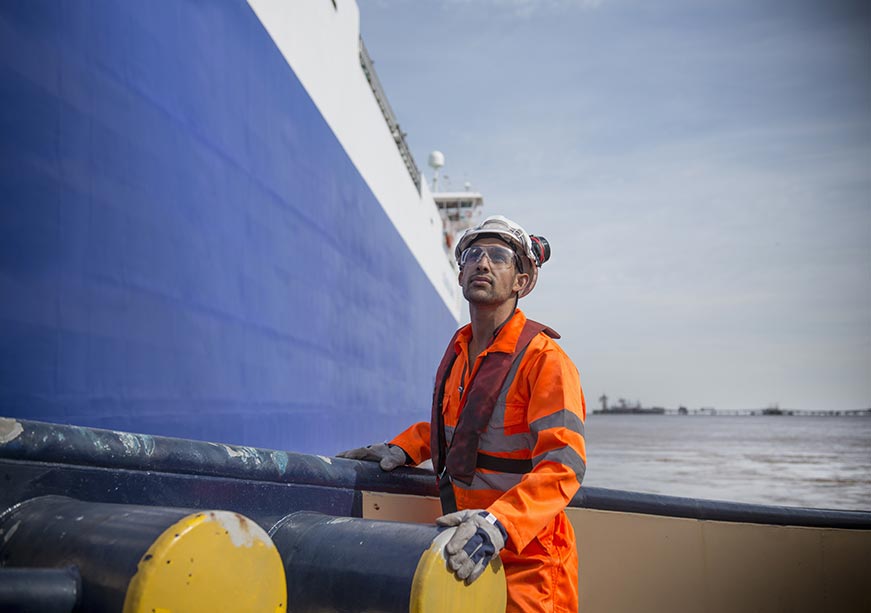-
CENTRES
Progammes & Centres
Location
Private security solutions, which are essential to the maritime sector, need to be reassessed with a focus on human rights, amidst ongoing geopolitical conflicts

Image Source: Getty
Without responsible security, aspirations to access new maritime environments and global trade routes risk being undone. Responsible security cannot be seen as a mere afterthought or tangential issue. Securing new frontiers in the maritime sector is more than threat-proofing geographical boundaries. It requires a holistic approach, bringing together an interconnected set of perspectives in a world that demands innovative solutions for maintaining security, protecting human rights, and sustaining the global supply chain.
In the late 2000s, brazen acts of piracy and banditry against commercial ships were at their peak—from the Gulf of Aden and the Indian Ocean, to the Gulf of Guinea and the Strait of Malacca. The international community and the private security sector joined efforts to tackle the threat of piracy, notably off the coast of Somalia. A combination of military, private security, and judicial initiatives were taken, and the use of armed personnel aboard ships became widely accepted by the industry and many flag states.
Securing new frontiers in the maritime sector is more than threat-proofing geographical boundaries.
Consequently, a decade ago, the role of private security in the maritime domain was much discussed and scrutinised. It was recognised that poor private security practices, at sea or in maritime supply chains, introduced substantial risks—not only to vessels and cargo but also to the lives of seafarers, private security personnel, and other maritime workers. Organisations such as the International Code of Conduct Association (ICoCA) and the International Maritime Organization (IMO) actively helped shape the narrative and standards of maritime security.
Whilst the number of piracy attacks off the coast of Somalia declined over the past decade, they are seemingly on the rise again. Other threats also persist globally in strategic locations for the maritime sector. The war in Ukraine and the conflict in the Middle East—which includes direct attacks against ships in the Red Sea—compounded with climate change—which led to a drop in traffic through the Panama and Suez canals of over 50 percent by mid-2024—have offered a stark reminder of the risks faced in the maritime sector.
Each region presents its own set of issues, with incidents ranging from armed robbery and hijacking to complex threats from non-state actors. Securing port infrastructures, vessels, waterways, and seabeds is fundamental to the smooth operation of global trade, and requires maritime security approaches that meet the highest international standards. Nowadays, effective security solutions need to combine physical and technological offerings, while also integrating human rights concerns.
Securing port infrastructures, vessels, waterways, and seabeds is fundamental to the smooth operation of global trade, and requires maritime security approaches that meet the highest international standards.
Regulatory frameworks governing private maritime security dating back to the 2010s were primarily reactive to that period’s high-stakes challenges. However, today’s maritime landscape is markedly different, with greater complexity, increased connectivity, and a broader spectrum of threats. As we move forward, a more nuanced understanding of the maritime security ecosystem and a clear identification of regulatory gaps is essential. In today’s globalised world, the process of securing maritime supply chains is complex and multifaceted. Addressing risks across these chains requires a coordinated effort from flag states, shipowners, port authorities and private security providers.
Amidst the emphasis on security, the rights and well-being of seafarers, as well as private security personnel, must also remain a priority. Protections should include fair treatment, humane working conditions, and adherence to the highest standards of safety. Given the demanding nature of maritime security work, both industry stakeholders and flag states bear responsibility for maintaining these rigorous standards. Additionally, shipowners and port authorities must select reputable security providers who prioritise the well-being of their personnel.
Today, ICoCA works closely with governments, businesses, and the private security sector to ensure that private security companies with maritime and land operations adhere to international norms and uphold human rights standards. Those that have joined ICoCA include the United Kingdom, the United States, Uruguay, Switzerland, Canada, Norway, and Sweden, as well as nearly 160 security companies globally and large multinationals such as Total Energies, British Petroleum, Philip Morris International, Barrick Gold, Glencore, Holcim, Newmont Mining, and Pan American Silver. Through certification, monitoring and compliance initiatives, ICoCA helps ensure that security personnel—both on vessels and onshore—are properly vetted, trained, and monitored in their operations. This is an approach proven to mitigate risks for shipowners and port authorities.
Through certification, monitoring and compliance initiatives, ICoCA helps ensure that security personnel—both on vessels and onshore—are properly vetted, trained, and monitored in their operations.
Maritime security is critical to the health of the global economy, and with the right approach, it can serve as a model for how private security and human rights can coexist harmoniously. Full vetting and training of security personnel (with specialised training for those carrying firearms), fair labour conditions (aligned at a minimum with those of other seafarers), proper management of floating armouries, and meeting all relevant legal requirements, should be prioritised. To achieve this, industry and regulatory stakeholders must welcome collaborative solutions that ensure the stability and security of the world’s waterways, vessels and port infrastructure. This means not only implementing robust security measures but also fostering a culture of accountability, compliance and ethics, where respect for human rights is systematically embedded in every aspect of maritime operations.
Ongoing conflicts and geopolitical tensions point to operating risks in the maritime sector are unlikely to abate. Consequently, navigating high-risk waterways will necessarily give rise to a renewed and increased use of private security. Poor security practices and weak oversight will, however, aggravate risks rather than mitigate threats. As was the situation in the late 2000s, there is, therefore, a case to be made for the reassessment of national and international frameworks currently governing private maritime security. By reinvigorating discussions on best practices for training, deploying and overseeing private security providers, modern security solutions, human-rights compliant, can be found to secure the new frontiers of the maritime sector.
Jamie Williamson is the Executive Director of the International Code of Conduct Association (ICoCA)
The views expressed above belong to the author(s). ORF research and analyses now available on Telegram! Click here to access our curated content — blogs, longforms and interviews.

Jamie Williamson has been the Executive Director of ICoCA since 2017. An international practitioner, he offers over 25 years of experience with international organizations, including ...
Read More +